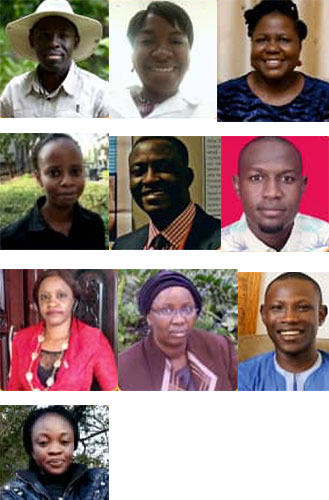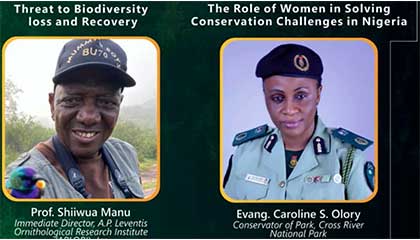The SCB Nigeria Chapter's 7th Biodiversity Conference took place virtually from 27-29 October 2020. "Biodiversity Conservation & Current Environmental Challenges" was the theme of the meeting, which brought together scientists and conservation stakeholders from across Nigeria and beyond.
 |
|
Members of the Local Organizing Committee of the SCB Nigeria Chapter's 7th Biodiversity Conservation Conference (left to right): Dr. Fola Babalola, Chair, Scientific Committee; President SCB Nigeria Chapter, Dr. Adedotun Afolayan, Chair, LOC; SCB Nigeria Chapter Vice President; Prof Bola Adeleke, Secretary, LOC; Dr. Michelle Fasona, Conference Finance Secretary; SCB Nigeria Chapter Treasurer; Dr. Oluwagbemiga Ojo, Conference Logistics; Dr. Abubakar S. Ringim, Conference Editorial; Dr. Oghenekevwe Arabomen, Conference Editorial; Dr. Fastuma Olaleru, Conference Editorial; Alex Onatunji, Conference Logistics; Adidemi Raji, Conference Logistics
|
The meeting featured two panel sessions, a keynote address, awards ceremonies, a virtual field trip, networking sessions and special talks, including an recorded greeting from SCB President-Elect Tony Lynam. More than 40 scientific talks were presented at the meeting under six sub-themes:
- Challenges and intervention in protected areas
- Impacts of climate change on biodiversity and adaptation / mitigation measures
- Green energy & green space development
- Pollution and waste on terrestrial and aquatic biological diversity
- Threats to species loss and recovery strategy
- Cross-cutting topics.
The chapter presented several awards, including the SCB Nigeria Chapter Awardees of 2020 NSCB Conservation Excellence: Prof Manu and Evang. Caroline Olory.
SCB Nigeria Chapter President Dr. Fola Babalola was a key organizer of the conference. He answered questions from SCB on what it was like to organize the virtual event and why it matters for furthing biodiversity conservation in Nigeria.
How did you select the themes for the conference?
We arrived at 13 conference sub-themes through deliberation among the members of local organising committee. Kindly find attached the flyers containing the 13 sub-themes and LOC. We eventually received papers for 6 of the sub-themes.
 |
|
The SCB Nigeria Chapter presented awards for conservation excellence to Prof Shiiwua Manu and Evang. Caroline Olory at the 7th Biodiversity Conference.
|
Why is the conference important for advancing biodiversity conservation in Nigeria?
Biodiversity is currently facing a lot of challenges in Nigeria. The country is fast losing its unique threatened and endemic biodiversity due to many issues. Hence the conference was organised to bring together conservation professionals and practitioners to discuss the issues with the view to preferring adequate and appropriate intervention.
The directors and key stakeholders in local, national and international conservation organisations in the country were invited to panel sessions and different talks. Papers presented at the conference were rigorously reviewed, and those that were in line with the conference themes and selected sub-themes were invited for presentations.
We also gave awards to specially selected conservation professionals and practitioners for their efforts over the years in building capacity for young conservation professionals and in saving the biodiversity of Nigeria. We strongly hope that these forums will generate practical ideas that can solve some of the conservation challenges in the country.
What the biggest challenges in organizing the conference?
Coordination of Local Organizing Committee on a virtual platform and not face-to-face is quite a challenge. Some members experienced issues with internet connection and data availability so we provided funds to members to purchase data. The learning curve for some authors to learn how to make virtual presentations proved challenging. We organised a series of online demonstrations on how to use Zoom for virtual presentations, how to make video and audio recordings for presentations, and provided tips for making effective slides, among other guidelines and best practices. Through this effort, quite a number of authors developed confidence in making their presentations before the start of the conference. Another challenge was unstable internet and power fluctuation during the conference preparation.
What do you hope will be the legacy of the conference?
The legacy of the conference is uniting conservation professional professionals and practitioners on a virtual platform to proffer solutions to some of the challenges facing conservation of biodiversity in Nigeria.
Author Bio
Fola Babalola is the president of the SCB Nigeria Chapter and a professor at the University of Ilorin, Nigeria.


